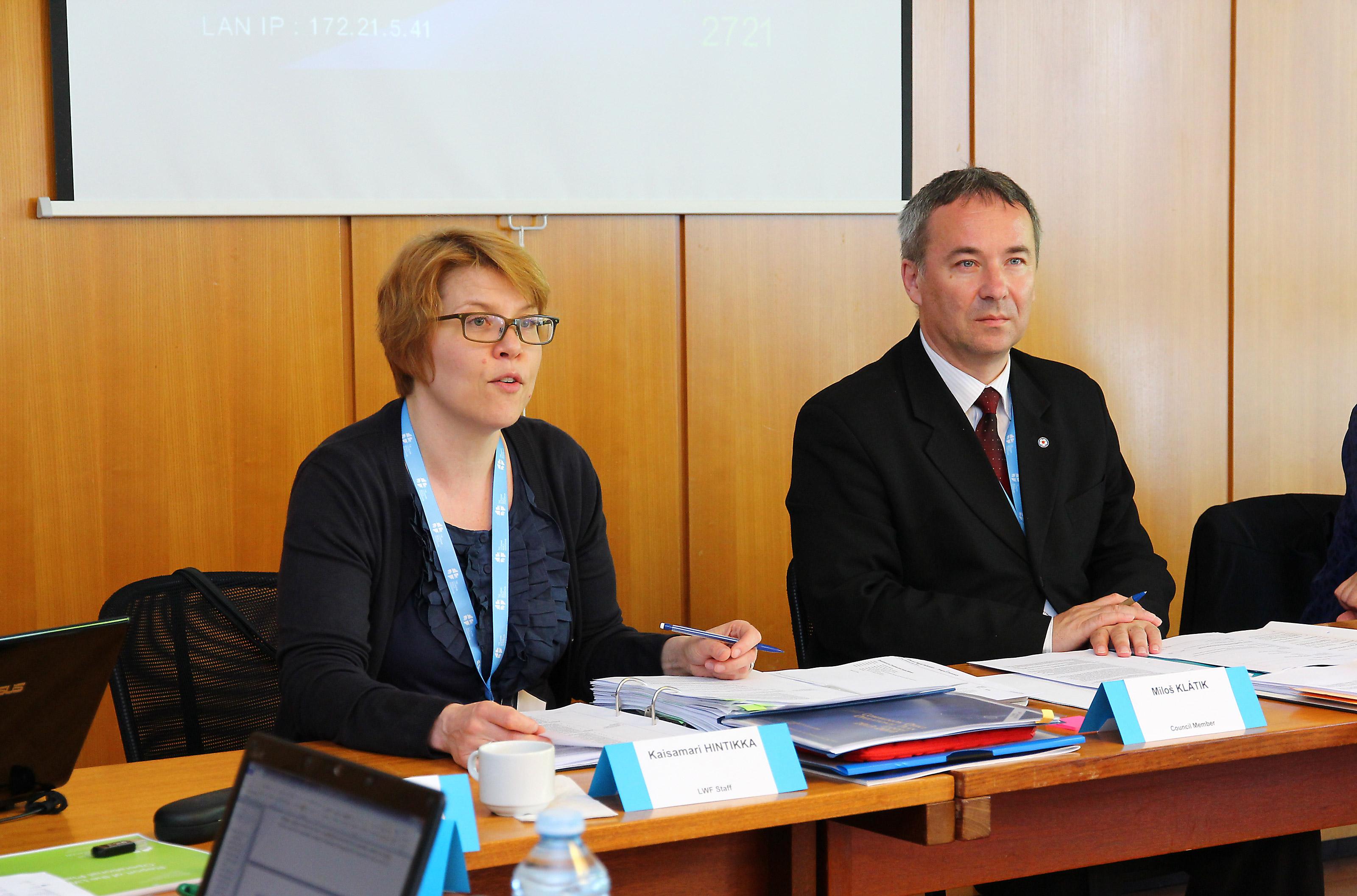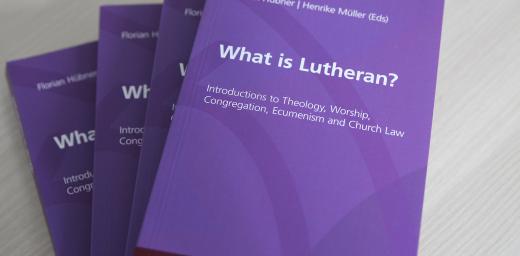LWF Adopts Gender Justice Policy

LWF/DTPW director Rev. Dr Kaisamari Hintikka (left) and committee chair Bishop Dr Miloš Klátik.
A Call to Promote Dignity and Justice for all Human Beings
(LWI) The Lutheran World Federation (LWF) has adopted a wide-ranging policy on gender justice that urges inclusive and sustainable communities, churches and programs throughout the global communion of churches.
The LWF Council or governing body endorsed the LWF Gender Justice Policy today, 18 June, in Geneva, Switzerland. The development of the document included years of study and consultation across the communion.
Receiving recommendations presented by the Committee for Theology and Ecumenical Relations, the Council recommended the implementation of the policy through the LWF regional expressions and member churches, with the expectation that the methodology would be adapted to local contexts. The General Secretary was requested to report on the policy’s implementation in the communion.
The theological approach proposed in this policy relies on justice as a fundamental concept that is embedded in the biblical and Lutheran theological notion of being justified by grace through faith. The document underscores justice as a prophetic announcement and the basis for bringing about transformation and ensuring the dignity of all.
Gender justice is expressed through equality and balanced power relations between women and men as well as through the elimination of institutional, cultural and interpersonal systems of privilege and oppression that sustain discrimination, the policy document notes.
The newly adopted policy calls for the promotion of gender justice as a theological foundation to proclaim dignity and justice for all human beings; and support towards women as a key strategy in ending the unequal distribution of wealth and the prevention of gender-based violence.
“The communion is called to live and work in Christ to address injustices and oppression and to create transformed realities, communities of good life with gender just relations that nurture and lead to the flourishing of all human beings,” the policy states.
An Instrument for Congregations
“The LWF Gender Justice Policy is to serve as an instrument for the communion and its member churches, congregations, groups and organizations to achieve equality between women and men by implementing contextualized measures that promote justice and dignity,” the document states.
The gender justice policy notes that the participation of women in the ordained ministry is a vital step towards building an inclusive communion, but also urges the full participation of women and men in decision-making bodies. The documents notes that by the end of 2012, nearly 82 percent of LWF members churches were ordaining women, while 18 percent were yet to ordain women.
“The church has not fully addressed the ways in which gender systems and relationships generate privilege for some and oppression and pain for others and thus affect our shared life in church and society,” the document emphasizes.
The policy is set in the context of LWF’s diaconal service to the world, which affirms the equality of all human beings, including the promotion and inclusion of women’s leadership and participation.
“The experience of the diaconal approach to upholding the rights of the poor and oppressed provides the practical basis for the conceptual understanding of justice at all levels and in all relations, specifically in gender relations,” the LWF Gender Justice Policy states.
Biblical Interpretations
The policy calls for a closer look at the interpretation of some biblical passages which appear to endorse gender inequality.
“The issue of gender justice has theological foundations in the biblical testimony and Christian tradition. While this theological and biblical tradition can be interpreted as affirming the cooperation between men and women in various aspects of leadership in the world, this conclusion is generally not fully lived out in the context of family, church and public space.
“Women tend to be overburdened with domestic responsibility, excluded from leadership in ministry and not encouraged to take leadership in the public arena,” the policy says.
“Dialogue that engages in and leads to reflection on gender issues and promotes change leading to gender justice practices challenging patriarchal and non-inclusive values in the churches and societies should be encouraged.”
Leadership and Decision Making
The policy underlines that it is vital for women and men to have equal opportunities to fully participate in the leadership and decision making in church and society. “In its values and practices, the church can and must set an example, thereby showing its actions are coherent with its prophetic preaching.”
The LWF policy was developed on the basis of numerous LWF Assembly decisions over many years, which have endorsed the gifts of women in leadership while promoting inclusivity in structures and governance.
“Embracing the full participation and equitable representation of women and men in leadership is a sign of the continuous reformation and transformation of the church.”
The policy calls for an end to silence concerning gender-based violence. “Gender-based oppression and violence, no matter how normative, traditional, or widely accepted they are in various contexts, are crimes and sinful; gender-based oppression and violence stand in contradiction to the gospel.”
The final version of the Gender Justice Policy will be published on the LWF web site in early September.





